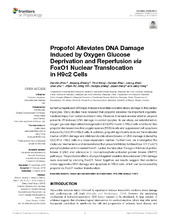| dc.contributor.author | Zhou, Dandan | en_US |
| dc.contributor.author | Zhuang, Jinqiang | en_US |
| dc.contributor.author | Wang, Yihui | en_US |
| dc.contributor.author | Zhao, Dandan | en_US |
| dc.contributor.author | Zhao, Lidong | en_US |
| dc.contributor.author | Zhu, Shun | en_US |
| dc.contributor.author | Pu, Jinjun | en_US |
| dc.contributor.author | Yin, Ming | en_US |
| dc.contributor.author | Zhang, Hongyu | en_US |
| dc.contributor.author | Wang, Zejian | en_US |
| dc.contributor.author | Hong, Jiang | en_US |
| dc.date.accessioned | 2020-05-14T14:55:19Z | |
| dc.date.available | 2020-05-14T14:55:19Z | |
| dc.date.issued | 2019-03-15 | |
| dc.Published | Zhou D, Zhuang, Wang Y, Zhao, Zhao, Zhu, Pu, Yin, Zhang H, Wang, Hong J. Propofol alleviates DNA damage induced by oxygen glucose deprivation and reperfusion via FoxO1 nuclear translocation in H9c2 cells. Frontiers in Physiology. 2019;10:223 | eng |
| dc.identifier.issn | 1664-042X | |
| dc.identifier.uri | https://hdl.handle.net/1956/22280 | |
| dc.description.abstract | Ischemia/reperfusion (I/R) injury induces irreversible oxidative stress damage to the cardiac myocytes. Many studies have revealed that propofol alleviates the important organelle-mediated injury from oxidative stress in vitro. However, it remains unclear whether propofol prevents I/R-induced DNA damage in cardiomyocytes. In our study, we established an oxygen glucose deprivation/reoxygenation (OGD/R) model in H9c2 cells and found that propofol decreased reactive oxygen species (ROS) levels and suppressed cell apoptosis induced by OGD/R in H9c2 cells. In addition, propofol significantly reduced the molecular marker of DNA damage and inhibited double-strand breaks of DNA damage induced by OGD/R in H9c2 cells in a dose-dependent manner. Furthermore, we investigated the molecular mechanisms and demonstrated that propofol inhibited forkhead box O 1 (FoxO1) phosphorylation and increased FoxO1 nuclear translocation through inhibition of protein kinase B (Akt) and adenosine 5’-monophosphate-activated protein kinase (AMPK) pathways. The protective effects of propofol against oxidative stress-induced DNA damage were reversed by silencing FoxO1. Taken together, our results suggest that oxidative stress aggravates DNA damage and apoptosis in H9C2 cells, which can be reversed by propofol via FoxO1 nuclear translocation. | en_US |
| dc.language.iso | eng | eng |
| dc.publisher | Frontiers | eng |
| dc.rights | Attribution CC BY | eng |
| dc.rights.uri | http://creativecommons.org/licenses/by/4.0/ | eng |
| dc.title | Propofol alleviates DNA damage induced by oxygen glucose deprivation and reperfusion via FoxO1 nuclear translocation in H9c2 cells | en_US |
| dc.type | Peer reviewed | |
| dc.type | Journal article | |
| dc.date.updated | 2020-01-28T10:20:40Z | |
| dc.description.version | publishedVersion | en_US |
| dc.rights.holder | Copyright 2019 Zhou, Zhuang, Wang, Zhao, Zhao, Zhu, Pu, Yin, Zhang, Wang and Hong | |
| dc.identifier.doi | https://doi.org/10.3389/fphys.2019.00223 | |
| dc.identifier.cristin | 1768819 | |
| dc.source.journal | Frontiers in Physiology | |

